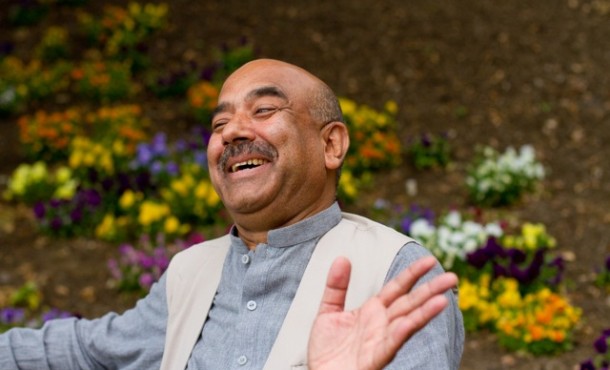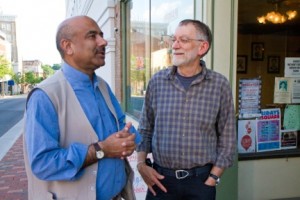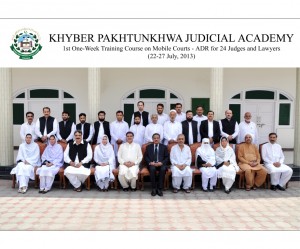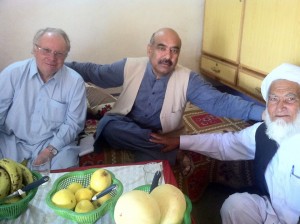Ali Gohar of Pakistan is first to receive CJP award for outstanding service
March 5th, 2015 by Zehr Institute

In May 2015, EMU’s Center for Justice and Peacebuilding (CJP) will be conferring its first Alumni Award for Outstanding Service on Ali Gohar, a Pakistani national who earned a CJP master’s degree in 2002. “In many ways, Ali represents what CJP is all about and thus is an excellent choice for our first alumni award,” says Howard Zehr, who taught Gohar at CJP and who co-directs the Zehr Institute for Restorative Justice. (Photo taken at EMU in 2012 by Jon Styer)
Marking its 20th anniversary year during 2014-15, the Center for Justice and Peacebuilding (CJP) will be conferring its first Alumni Award for Outstanding Service on Ali Gohar, a Pakistani national who earned a CJP master’s degree in 2002 on a Fulbright scholarship.
“This award will be given annually for CJP alumni who have demonstrated exceptional commitment to CJP’s mission of supporting conflict transformation, restorative justice, trauma healing, development, organizational leadership, and peacebuilding efforts at all levels of society,” wrote CJP executive director J. Daryl Byler in a letter notifying Gohar of the honor.
“The Alumni Committee unanimously selected you based on your consistent peacebuilding work across the years,” Byler said. All of the 450 alumni who have earned master’s degrees or graduate certificates in conflict transformation from CJP were eligible for this award.
Gohar will be the first recipient of this award in a May 2015 ceremony (the actual day and place in May is to be determined, as it hinges on Gohar’s travel plans), which will be co-sponsored by the Zehr Institute for Restorative Justice. Both CJP and the Zehr Institute are based at Eastern Mennonite University in Harrisonburg, Virginia.

Ali Gohar and Howard Zehr in 2012 (Photo by Bonnie Lofton)
“Ali engaged deeply with the CJP learning environment and community while he was here,” says Howard Zehr, who taught Gohar at CJP and who co-directs the Zehr Institute. “Since returning to his home context, he has doggedly and creatively worked to contextualize, apply and promote restorative justice and peacemaking in the region.” Zehr and Gohar co-authored A Little Handbook on Restorative Justice in 2003, adapted and translated by Gohar for Pakistan from Zehr’s U.S. bestseller, The Little Book on Restorative Justice.
Inspiration to many
“His methodologies and courage have been an inspiration to many, including our own students and graduates,” adds Zehr. “In many ways, Ali represents what CJP is all about and thus is an excellent choice for our first alumni award.”
The award covers the cost for Gohar to attend a session of EMU’s 2015 Summer Peacebuilding Institute, including a class of his choosing, round-trip transportation to get to SPI, and lodging and meals for the week of the class.

In 2013, with a UNDP grant, Just Peace sought to bolster the performance of Pakistan’s court system by training 12 judges and 12 lawyers to staff a “mobile court” (actually a bus that went from village to village) to clear a backlog of cases, some as old as 15 years. Gohar, wearing brown, is second from right, seated. (Photo courtesy of Gohar)
In 2003, soon after completing his master’s degree at EMU, Gohar founded an organization that is now called Just Peace Initiatives (JPI). He called himself the “rehbar” of JPI, which is the Urdu word for a guide, someone who shows the path. Through TV programs, workshops, conferences, speeches, and publications, Gohar has sought the integration of modern thinking (such as respect for women’s rights) with Pakistan’s community-based traditions of solving problems and promoting reconciliation.
Operating from a modest office in Peshawar, Pakistan, currently staffed by seven, JPI has been a major influence in Pakistan, especially in the volatile border region with Afghanistan, according to John Braithwaite, a renowned criminologist on the faculty of Australian National University. Braithwaite spent a month doing research in Pakistan in the spring of 2013 and co-authored a paper with Gohar on his findings, including fact-checking a widely republished news blog that damaged Just Peace’s reputation in 2013. [Gohar’s work and Braithwaite’s views are more extensively explored in this Peacebuilder online article.]
Endorsed by Australian expert
About Gohar, Braithwaite says:

Professor and criminologist John Braithwaite (left) of Australian National University during his 2013 research visit to Pakistan. (Photo courtesy of Ali Gohar, center)
In conditions where hundreds of jirga leaders have been assassinated by the Taliban, and jirgas attacked by suicide bombers (because the jirgas are more popular than the Taliban justice system), Just Peace initiatives has innovated with collaborations between state justice and restorative justice in order for jirgas and muslahathi committees to be held in secure conditions. Under the inspiring leadership of Ali Gohar, Just Peace Initiatives has been a practice-based think tank focused on retrieving the wisdom and the restorative qualities of Pukhtoon traditions, while also campaigning for respect for human rights.
Though pleased by Braithwaite’s words, Gohar notes he is not interested in challenging the Taliban, but rather in assuring them that positive traditions, such as jirgas, and life-affirming religious faith have roles to play in modern Pakistan.
Pakistan’s TV and radio audiences have received Gohar-written and Gohar-researched shows that convey lessons about conflict transformation and social justice. For International Woman’s Day this year, for example, an alliance of organizations called End Violence Against Women and Girls sponsored a Gohar-written play for radio broadcasting. This play centers on the relationship of the abuse of females to the spread of HIV-AIDS. This is Gohar’s eighth play on social justice themes, including the injustice of honor killing. In 2007, Gohar produced a 13-episode TV program for Pakistani TV on violent conflict titled “Why it’s happened.” For it, he interviewed police, religious experts, jirga practitioners, and psychologists, probing the root causes of ethnic, tribal, and political conflicts.
About 6,000 have attended one of the day-long workshops held by Just Peace in all four provinces of Pakistan since 2003, and 2,027 have attended one of the three-day Just Peace workshops, based on statistics provided by Gohar in February 2015. The attendees included 900 women.
Model provided by Bacha Khan
Over the years, major funders of Just Peace projects have included United Nations agencies (UNDP, UNHCR, UNFPA, UNICEF, UNOCHA), Asia Foundation, the Australian Department of Foreign Affairs and Trade, the Greek Ministry of Foreign Affairs, the European Union, Catholic Relief Services, U.S. Institute of Peace, Concern Worldwide, and International Fellowship of Reconciliation.
Gohar says his personal hero is Abdul Ghaffar Khan (1890-1988), a friend of Gandhi’s who fought nonviolently for his people’s independence from the British in the mid 1900s. The Bacha Khan, as he is affectionately called, was a Pukhtoon political and spiritual leader (100,000 followers in his non-violent army, called “Servants of God”), a lifelong pacifist, a believer in the equality of women, a champion of the poor, and a devout Muslim

Ali Gohar photo by Howard Zehr
For more information on Gohar, see articles on his work in these issues of Peacebuilder magazine, published bi-annually by CJP: Fall-Winter 2013-14, “We the People of the UN Desire Peace”; Spring-Summer 2011, “Restorative Councils Help Pakistani Police” and “Disaster and Peace”; Spring-Summer 2010, “Updating Jirga.”
Editor’s note: A more thorough exploration by Bonnie Price Lofton of Ali Gohar and Just Peace International, including challenges to the validity of their work, can be found here.


